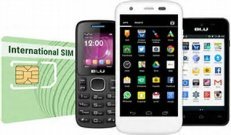International Cell Phones - Save Money When You Travel!
Do you travel internationally?! In today's connected world, the topic of international cell phones has become more and more important. I can recall growing up and going on vacations with no expectations from friends, family, or work, that they'd be able to call me. Email was just barely catching on, and text messaging had yet to even exist as an idea! Wow, I can't even imagine a world like that now; yikes!
Well, times have changed, and for better or worse, we want and expect to be connected while traveling. Whether it's for work, to check in with family, or to connect with travel companions regarding meeting plans and the like, we want to be in touch! In the not-so-distant past, this wasn't so easy. We had access to cell phones, but the problem was cost. Carriers charged small fortunes to roam internationally on a North American cell phone, and renting international cell phones was available but very costly. Then, of course, there's the problem of compatibility, whereby the phone we have doesn't work in the country in which we're traveling.
While the cost of using international cell phones has come down, and there are a number of ways to address compatibility, the bottom line is that taking the phone you currently use in the U.S. or Canada, and using classic roaming abroad is simply still too expensive. Also, even if phones are technically compatible, they're too often locked, meaning that they can only be used on specific carrier networks (though unlocking has become easier and easier over time). Thankfully, there are now numerous options to address your international travel needs!
Compare Providers of Prepaid
SIM Cards Now!
The Solution - Prepaid SIM Cards!
What's a prepaid SIM card? Well, to understand this and how it's connected to international cell phones, you'll need some basic background about wireless technology.GSM Technology is Required
There are two basic technologies, CDMA and GSM. Each CDMA phone has a unique number, an identifier or serial number if you will, that allows a wireless carrier to activate in on their network in order to provide services. While some fancy maneuvers can be done to allow a CDMA phone to work on different networks (i.e. phone flashing), generally speaking, it's tied to the host carrier (the carrier that sold you the phone in the first place). This means that CDMA international cell phones essentially do not exist.On the other hand, GSM has two essentially components, one being the handset itself, and the other one being the SIM card. The SIM card is the postage stamp-like sized card in your phone usually under the battery (micro SIM cards are even smaller!). The SIM card is the brains of the phone in that it is the piece that uniquely identifies your account on the network. So what does this mean? The significance is that with GSM phones, you can easily take out your SIM card and put in into another GSM phone, or you can put a SIM card from another carrier into your existing phone and it will work (assuming your phone is unlocked)!
This makes GSM the ideal candidate for international cell phones. There are some nuances and exceptions to this that I get into below, but the basic gist of it is what's important. In other words, if you have a CDMA phone, you're stuck on the carrier from which you bought the phone (and roaming internationally and paying high fees to your home carrier). If you've got a GSM phone, you have a lot more flexibility. Fortunately, 4G LTE is a GSM-based technology, meaning that most modern phones that are unlocked can be easily used internationally.
To learn more about what GSM and CDMA (and other terms) stand for, you can visit the Wireless Terminology page.
Can I use my GSM/LTE phone internationally?
Yes, and no, or shall I say maybe! Generally speaking, GSM/LTE phones can be used on different provider networks around the world, and require only the purchase of a new SIM card in the local country. This allows you to avoid paying huge roaming fees and extra charges to your carrier at home.So why "maybe"? Well, the problem is that most phones in Canada and the U.S. are locked, which means that they can only be used on the originating carrier and not as international cell phones. Some carriers will sell specific handsets that come unlocked (often referred to as "world phones"), and many will often provide you with the unlock codes if you've completed your contract with them. The reason they do this is to avoid you from leaving them before they've recouped the subsidy they invested in offering you a phone that's worth many hundred dollars for only $50 or $200 for example. To learn more about handset subsidies you can link over to the Subsidies section, or learn more about Unlocking Cell Phones..
Home
›
International Cell Phones
| Be Heard! Let prepaid wireless providers know what you want; fill out the survey now. |



Comments
Have your say about what you just read! Leave a comment in the box below.